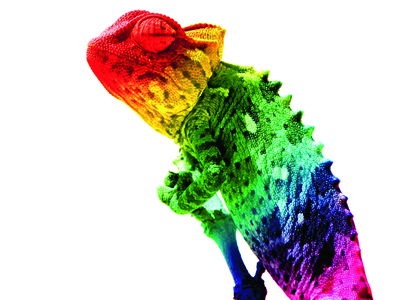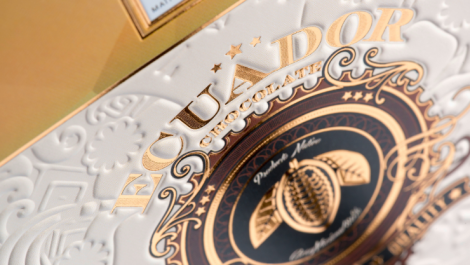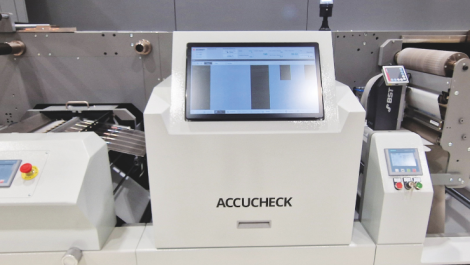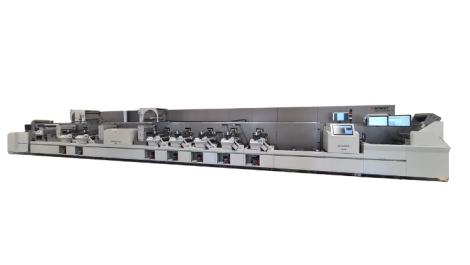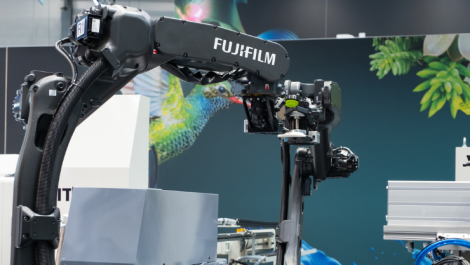The various digital processes – be it electrophotography or inkjet printing – put different demands on the media that can be printed on. The substrate suppliers all conduct extensive testing of materials to optimise adhesion, strength and quality of print. By Neel Madsen.
Substrate suppliers have to continually adapt to the rapid changes that the digital printing market presents. There can be no compromise in the quality of the final product and the substrate needs to be constructed for the print process chosen in order to optimise its performance.
Avery Dennison has experienced growth in the digital portion of its labelling business over the last 10 years. The company’s portfolio of top-coated digital pressure-sensitive materials supports label converters and packaging brand owners as they explore new methods to increase product visibility and differentiation in a crowded consumer packaging marketplace while enhancing overall operational efficiency.
‘In terms of label substrates, film is really increasing in popularity across our portfolio,’ said Kunhao Wang, business development manager, digital products, label and packaging materials. ‘Within Europe, film now makes up 30-40% of Avery Dennison’s portfolio – and it is showing faster growth than paper. The cost of film is coming down, plus it opens up even greater possibilities for compelling designs and effects such as a ‘no label’ look design, conformable shapes, and labels used in wet environments.’
Growing portfolio
Avery Dennison’s close relationships with leading equipment manufacturers enables it to continually expand its portfolio with high quality, affordable paper and film solutions. In 2012, it became the first global preferred pressure-sensitive media partner for HP Indigo digital presses. Currently, its broad digital portfolio encompasses more than 130 HP-certified products. The company also offers specially developed digital label printing solutions for customers using Xeikon 3000 digital presses and inkjet technologies.
‘Compared to electrophotography, UV curing and water-based inkjet platforms offer advantages in speed, capital investment and format flexibility with no compromise to print quality,’ said Ms Wang.
She continued, ‘Inkjet is a fast developing and very exciting area with changes and innovations coming out to the market every a few months. Just as Avery Dennison pioneered HP Indigo materials, we are striving to lead the market again with our latest product solutions. The recent introductions include optimised paper stock for UV inkjet printing and special coated film and paper materials designed for memjet engines.’
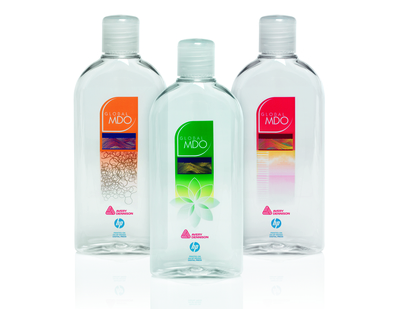
Avery Dennison’s high-performance Global MDO film is particularly suitable for home and personal care
‘Digital printing enables label and packaging converters to respond efficiently to demands for short runs, fast turnarounds and late-stage differentiation, in particular from the FMCG sector, as well as to address sustainability requirements,’ she added. ‘Avery Dennison’s digital printing solutions offer digital ready top-coated products with excellent print quality and optimal ink adhesion, plus enhanced productivity.’
Recent additions include TC7214 Indigo Topcoat that eliminates in-house priming for specific products aimed at the home & personal care and food markets. Removing the need for in-house coating gives major benefits, cutting production times and also reducing the risk of failed runs.
Further supporting the sustainability aspects of digital, Avery offers an HP Indigo-certified digital print-ready version of its high-performance Global MDO film. Global MDO Clear and White labelling films for home and personal care products promises better label clarity and conformability for improved performance and enhanced sustainability. The films feature a balance of properties that eliminates darts and wrinkles in high-speed dispensing environments and challenging packaging formats.
The S7000 adhesive technology increases productivity with up to 50%, offers lower ooze and elimination of adhesive contamination in critical processes. The complete construction is approximately 50% thinner than today’s standard product of PE85 film on glassine liner. Global MDO therefore delivers almost twice as many labels per roll, for overall better operational efficiency throughout the supply chain.
Adapting
Established in 1849, Smith & McLaurin (SMCL) is a manufacturer of materials for pressure sensitive self-adhesive labels, tickets and tags, supplying materials to leading retailers, global beverage brands, food manufacturers, pharmaceutical companies and logistics service providers.
Some years ago, various digital label printers from the UK and Europe independently approached SMCL, expressing a desire for label stock materials that would print digitally without in-house prime coating. The company realised there was a gap in the market for reasonably priced equivalents to conventional products.
In response to this need and drawing on its flexible coating capabilities, the company created a portfolio of products that would print without any intervention from the label printer. In addition, it could offer a much more varied substrate choice to use with these new press technologies.
‘The new generation water-based and UV digital inks and the existing wet and dry toners are responding well to the challenges of the market, becoming more robust and combining successfully with our improved and more resistant media. These advances are enabling digital print to thrive in more diverse applications, often opening up semi-industrial label opportunities,’ said Mitch Lambert, business development manager UK & Europe.
AdaptDIGI is a rapidly growing range of digitally printable label, ticket and tag materials, tried, tested and approved by the SMCL’s extensive digital-ready customer base. Bespoke materials that have certifications, are profiled and scripted with some of the world’s largest press manufacturers and distributors including HP, Xeikon and most of the leading UV and water-based inkjet OEMs.
Mr Lambert said,’AdaptDIGI is the innovative result of experience, expertise and a willingness to evolve – and it continues to evolve, with every bespoke iteration. The materials are available with a range of proprietary digital top coatings, each tailored for different end applications, and tuned to offer exceptional print results, image stability and durability – delivered with sensible minimum order quantities that are palatable enough for today’s quick turnaround, short run supply chains.’
He concluded, ‘Our unrivalled knowledge base can help you design custom laminates, ‘digital ready’ to ensure that customers have convenient access to a wide choice of material solutions, irrespective of the type of press they run or the application in question.’
Suitable choice
‘At UPM Raflatac, we are seeing more and more label printers adopting digital printing technology. Typically, they are running digital machines alongside conventional presses, though some printers now specialise exclusively in digital,’ said Jouni Iiskola, business segment manager, digital labelling, UPM Raflatac EMEIA. ‘We’re constantly expanding our product range to fulfil market needs in all end-use segments employing digital printing technologies, just as we do for conventional printing.’
The company works in close cooperation with OEMs to develop industry front-running expertise in product development, materials testing and quality. Mr Iiskola continued, ‘Our product development takes into account all printing methods – we design and test our standard products for compatibility with digital presses wherever we can. Due to the extensive scope of our materials testing, we’re able to recommend the most suitable choices for specific digital technologies.
‘By passing this knowledge on to our customers, we enable an appropriate choice of label stock with compatibility for both conventional and digital printing methods, which helps printers rationalise their stocks. This in turn makes it possible to achieve the fastest digital turnarounds with maximum cost efficiency.’
UPM Raflatac supplies a comprehensive range of self-adhesive paper and film labelstock for all current digital technologies. Its extensive product range covers all end uses of digital and conventional label materials.
Efficient service and reliable on-time delivery from stock is essential in the current market of short lead times. The company’s label stock has a long shelf life, and this enables fast print runs from stocks that printers can carry themselves. The consistent quality of materials is produced on proprietary production technology to help printers produce highest quality labels. Mr Iiskola explained, ‘It is our job to provide the speed and quality essential for label printers seeking positive differentiation in a competitive digital marketplace.’
The company is an HP Indigo preferred media partner and offers label materials certified for HP Indigo and backed by HP support. It also offers an expanding range of qualified materials for Xeikon presses covering all applications. Being able to use the same label stock for conventional and digital printing reduces costs on fast digital lead times. Almost all materials in UPM Raflatac’s range provide excellent results on Xeikon 3000 series presses without additional surface treatment, and its PE films are tested for the new Xeikon ICE toner system.
To respond to the growing market for UV Inkjetmaterials, the companytest all its mainstream products on UV inkjet presses to help printers select conventional materials best suited for their digital presses.UPM works with UV inkjet press manufacturers to stay up to date with the latest developments and best assist customers with appropriate label stock recommendations.
For printers starting out in digital, the company has a ‘welcome pack’, which includes a selection of its most used products.
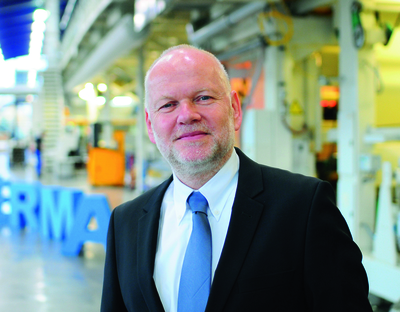
Dr Thomas Baumgartner, managing director of Herma GmbH
Expanding the uses
‘Digital printing is now firmly established as an ideal complement to conventional techniques in the label segment as well. It enables printers to respond to customers’ wishes with greater flexibility and offer low volume production at a favourable price. Unfortunately, however, printing machine manufacturers are not yet able to supply presses capable of applying the digital technique directly, without a primer for example, to the full range of conventional materials. This applies both to machines that use dry or liquid toner, and to water and UV inkjet printers. This drawback is severely impeding the further expansion of digital printing. On the other hand, we believe that innovations in printing technology will soon overcome this shortcoming. Standard stock will then be easy to print even without a special surface treatment,’ said Dr Thomas Baumgärtner, managing director of Herma GmbH.
The company has introduced a special Inkprint collection. This self-adhesive material allows print shops to produce short and very short label runs on economical inkjet printers with water-based inks. Whereas conventional self-adhesive materials are generally adequate for UV-curable inks, water-based ink requires a special paper coating that can absorb the ink better. The two grades included in the new range, HERMAinkprint glossy (grade 211) and HERMAinkprint matt (grade 137), promises outstanding results on standard inkjet printers, such as Canon, Epson, HP, etc, with both sheet and web printing. They are also suitable for memjet technology. Even at speeds of over 300 millimetres per second, printed images, codes and identification symbols can be clear and distortion-free in conjunction with the new range.
Both grades feature Herma’s 62Gpt adhesive. Its multilayer structure paves the way for the labels to be used in a wide variety of applications- while at the same time offering excellent processability and a price/performance ratio. Their uses range from carton labelling to labels for cool and moist food packaging. The adhesive is further distinguished by its very good migration behaviour and has been approved by the German test institute ISEGA for direct contact with dry, moist and fatty foods (reduction factor 2). In conjunction with honey glassine release liner and coated kraft release liner, the label stock offers superior properties for processing on all typical flatbed and rotary die-cutting machines.
The company has also recently introduced a new protective overlaminating film ideally suited for short runs of paper labels, making them suitable for use in harsh and critical environments. The film comprises of a self-wound self-adhesive film without liner, so no additional waste is produced during the conversion process; the roll feeds in from a spare unwind mandrel and overlaminates the printed media prior to die-cutting.
This provides the labels with optimum protection against both mechanical stresses, such as that caused by friction, as well as moisture, greases and oils. Consequently, the overlaminating film with its permanent acrylate adhesive can be used as an attractive and economical alternative to high-cost special materials in many cases.

